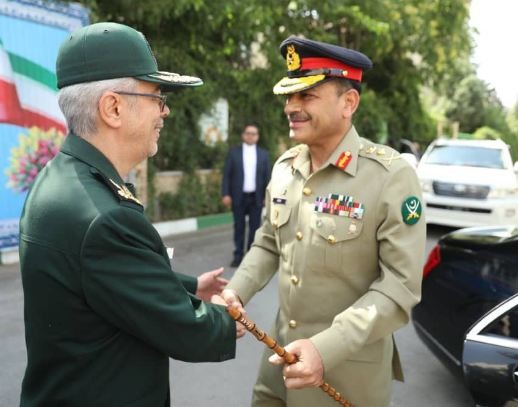– Mohammed Talha Siddi Bapa
Tehran/Islamabad: As the latest wave of military hostilities between Iran and Israel comes to a temporary halt, a firestorm of speculation is spreading across Iranian media. At the centre of the controversy is Pakistan’s Chief of Army Staff, General Asim Munir, who is being accused of playing a covert role in the June 13 airstrike that killed Iran’s top military commander, General Mohammad Hossein Bagheri.
The Iranian military chief was reportedly killed alongside other senior officers in a high-precision Israeli strike that also targeted multiple nuclear scientists and defence leaders in Tehran and elsewhere. As per The Wall Street Journal and The Times of India, the operation marked one of Israel’s most devastating intelligence-led strikes to date.
What has drawn widespread attention is General Munir’s official visit to Iran on May 31, barely two weeks before the fatal strike. During his meeting with General Bagheri, he reportedly presented a gift – a wristwatch. Iranian state-aligned media now allege that this watch contained a GPS tracker, which may have enabled Israeli forces to monitor Bagheri’s precise movements leading up to the June 13 attack.
“This wasn’t just a gesture of diplomacy – it might have been a digital Trojan horse,” claimed one Iranian journalist on a prominent TV panel. The theory has since gone viral on Iranian social platforms, with users questioning how Israel could have obtained such sensitive positional data on a high-ranking official whose location was a closely guarded state secret.
The suspicions grew stronger when it was reported that General Munir flew directly to the United States after his Tehran visit, where he reportedly held a private meeting with President Trump and later attended a banquet in his honour. Iranian sources suggest that this timing was more than coincidental, and that confidential information may have been exchanged during this visit, allegedly strengthening U.S.-Israeli coordination against Iran.
“This war may have been fought by Israel, but it was scripted in Washington,” read an editorial in an Iranian daily.
Adding weight to public suspicions is the scale of the Israeli strike: approximately 15% of Iran’s nuclear scientists have reportedly been eliminated since the conflict began, according to The Australian, along with multiple senior IRGC commanders. These include individuals stationed in highly secure and undisclosed locations, raising uncomfortable questions about the source of the intelligence.
Iranian commentators argue that past visits by Pakistani military leaders – in the context of close geographical proximity – could also have played a role. If multiple such gifts were distributed, could they have collectively created a live-stream of intelligence for Israel and its allies?
As one prominent Iranian columnist wrote: “The people we welcomed as friends may have been the ones pointing the way to our enemies.”
To date, neither the Iranian, Pakistani, nor U.S. governments have issued any formal response to the allegations. Israeli authorities have also remained silent. Meanwhile, The Guardian and other international outlets continue to report on the fallout of the June 13 attack, including its impact on Iran’s military chain of command and nuclear infrastructure.
While the GPS watch theory remains speculative and unsupported by forensic evidence, it has nonetheless taken hold in Iranian public discourse. The narrative combines elements of betrayal, espionage, and geopolitical manipulation – creating a volatile mix that could shape Iran’s regional diplomacy in the coming months.
At its core, the controversy reveals more than just suspicion; it reveals a deep sense of betrayal. For many Iranians, the idea that a neighbouring country – long viewed as a brother in the Muslim world – might have been complicit in such a catastrophic strike cuts deeply.
As the geopolitical dust continues to swirl, one truth remains clear: in the shadow war playing out across West Asia, gifts are not always what they seem.




